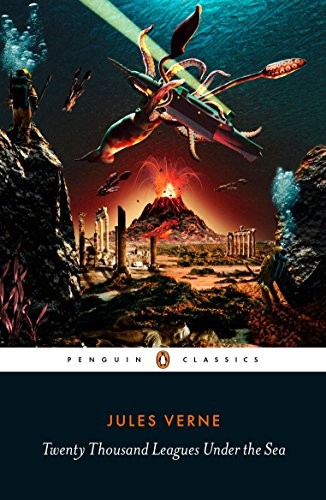Bee reviewed Twenty Thousand Leagues Under the Sea by Jules Verne
Review of 'Twenty Thousand Leagues Under the Sea' on 'Goodreads'
5 stars
Jules Verne's 20,000 Leagues Under the Sea is an incredible read that tells the tale of many fascinating characters but is told from the perspective of Pierre Aronnax, a professor of Marine Biology who along with his loyal assistant, Conseil is tasked with finding a monster who is causing havoc beneath the waves. A monster that seems able to travel faster than any marine inhabitant that Aronnax has encountered and his curiosity is spiked and his ego fit to burst to be known as the man who found the anomaly. But of course, things do not go to plan and everything Aronnax, Conseil and the hunter, Ned Land have known when they sink beneath the waves turns out to be wrong and they see the world anew.
The Nautilus becomes their new prison and Verne's creation sounds incredible and truly shows just how ahead of his time he was with his ideas and concepts of what is possible in his tales. It's 20,000 Leagues Under the Sea that also tells me that a man who would pass away in 1905 had an almost impossible ability to see what we would do to this planet and what we would need to survive due to his fictional creations. I would love to see the Nautilus come to life just to see what Verne's ideas would look like because the descriptions in this tale are so vivid and imaginative.
Aronnax, Conseil and Ned Land's encounter with the enigmatic Captain Nemo is unsettling and whilst they are surrounded by wonders that many of their counterparts wouldn't believe, the three are wary and I found myself torn between loving Nemo for his imagination and ways of seeing the world or rather those on land and wanting to shake him and demand he free these men who have unwittingly found themselves at his mercy. After all, the Nautilus may have everything you could want but they were still at his mercy and Nemo seems to balance on a knife-edge with his moods.
I cannot help but imagine Jules Verne researching so much before writing this classic tale that initially was serialised in a French periodical so that he was able to blend the fiction with the factual and legend seamlessly - something that Verne does perfectly. It's a tale of adventure, of disillusionment, of loss, mystery and Verne gives us a book that has lasted from 1870 and I don't think Nemo and his love of the Ocean are going anywhere. I just wish I had re-read it sooner as the last time I did I was a child and so much went over my head.
To imagine travelling so far around the world and remain for the most part beneath the waves sounds incredible and perhaps it's my lifelong love of the ocean and swimming but I would have loved to be upon the Nautilus.
Nemo deserves so much more than he has, and I do think it's sad to not have Verne explore more about how his tragedy had shaped Nemo as a man as we only see glimpses near the end of the book and it almost feels too little too late to fully understand just why Nemo has lost his faith in humanity.
One can only imagine how Jules Verne would react to how much people still love his writing, his imagination and the characters he gave us.

